7 Effective Time Management Tips For Students
There are lots of students who I see on a weekly basis who are jam-packing their week with so many extracurricular activities that their studies are starting to suffer yet I also see others who thrive under pressure.
I also regularly come across students who have minimal obligations and don’t even know where to start when it comes to planning their day to day commitments (aside from making sure they have time to check their snapchat streaks)!
To me, there is one very distinct difference between my students who are busy and successful and my students who have too much time on their hands and failing: their time management
The point of this is that across the ‘busy’ spectrum, there’s an array of people. However, no matter what end you fall, your best way of advancing in your schooling, career or in your extra-curricular activities is to manage your time effectively.
Whether you consider yourself to be an overachiever, a procrastinator or a perfectionist to name a few, regardless, you need to know the ins and outs of your daily schedule to maximise your time! Here are a few handy tips and tricks that I recommend to my students when planning from week to week.
Tip 1. Use a Diary
I don't care what format it comes in - JUST USE ONE
Using a diary is one of the simplest ways to manage your time. How you use your diary though will depend on just how effective you manage your time. Most importantly though, you have to make your diary work for YOU.
For me, I believe you can never go wrong as long as you write everything down in the one place. Writing little reminders for yourself on a bunch of different pieces of paper is never going to end well. Especially when you have a million other loose sheets flying around on your desk!
So, first things first, get yourself down to Kmart and buy a notebook for under $5 and write everything down in there. However, if old-fashioned pen and paper is not the most effective method for you, utilise our technology-savvy era and find another method that suits you.
Set reminders on your phone, share your google calendar with your colleagues and peers or use popular organisational apps such as Trello or Asana. Envision pen and paper as your tool to building organisation. If it doesn’t work for you, it’s like building a house with an axe. Go find yourself a hammer.
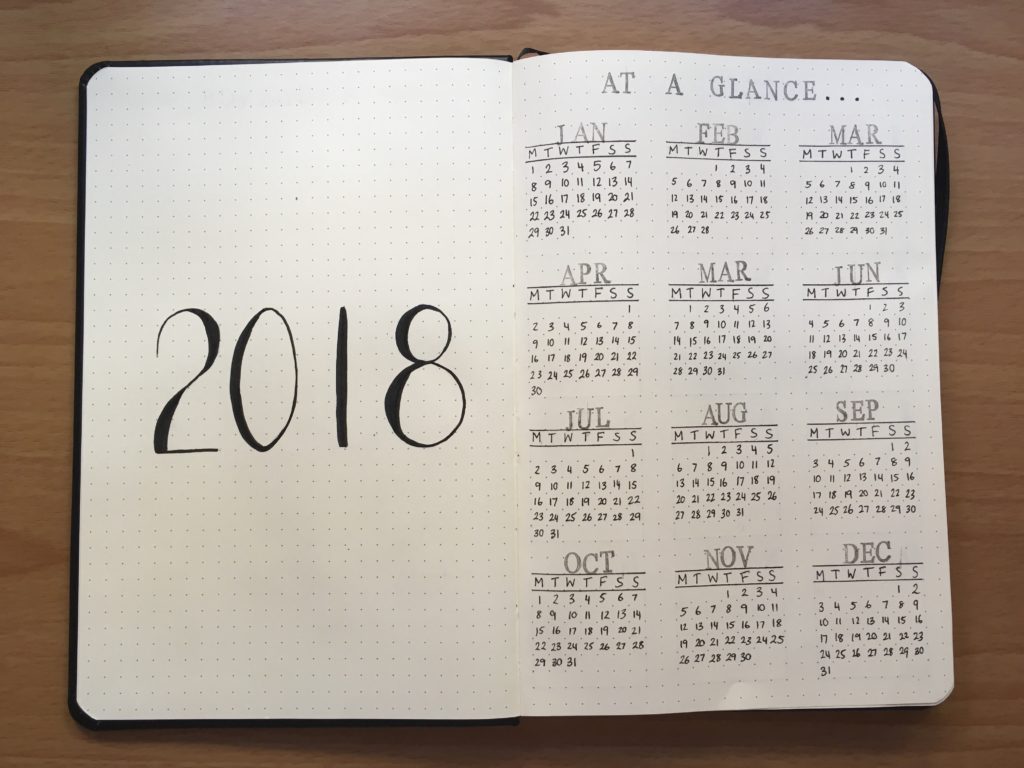
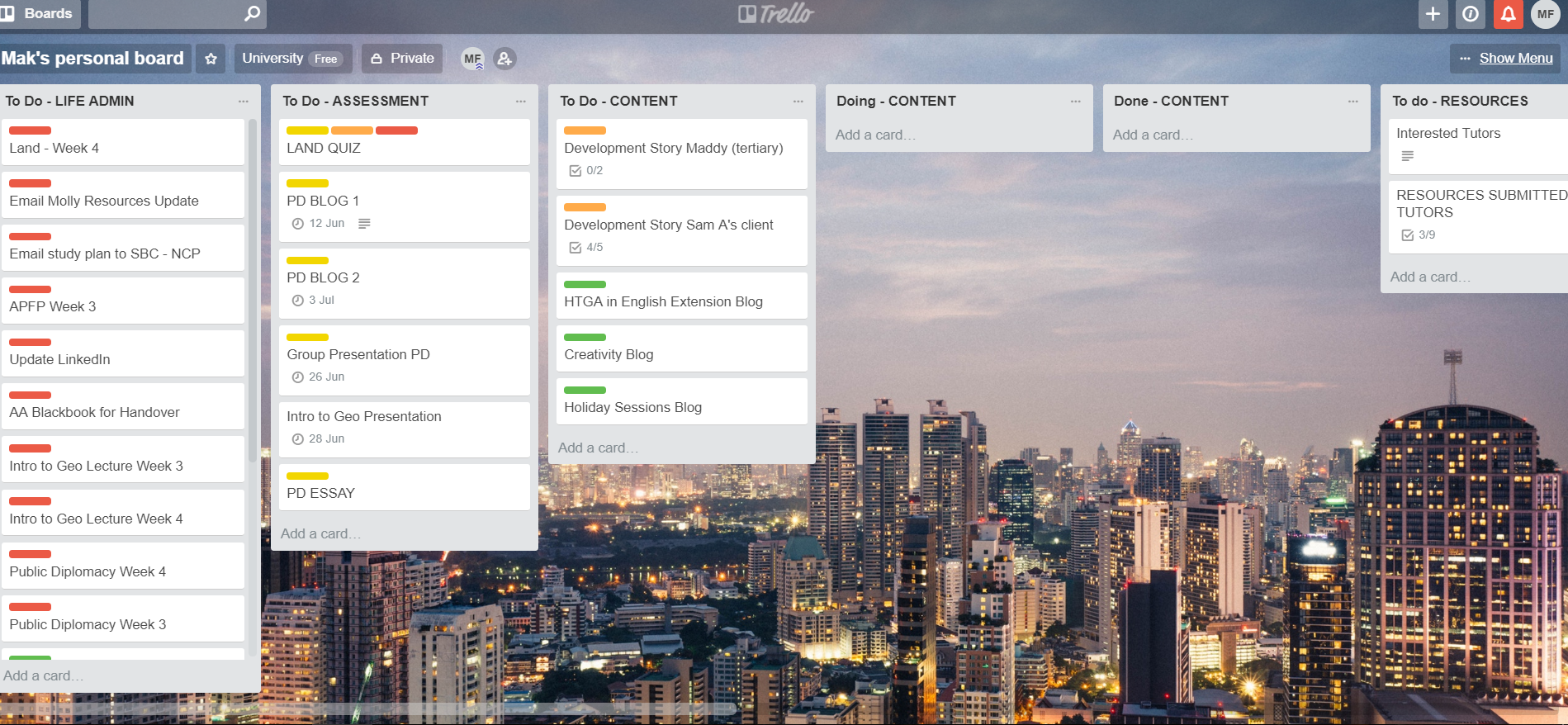
Next step; personalise your method! Personalising a diary gives you the opportunity to be a little bit creative and have your personality reflected on paper. If you’re the kind of person who needs a little bit of a motivation kick to start ticking off your daily tasks, start with some inspirational quotes or even a weekly goals page.
Ticking off those accomplishments at the end of the week is a little reward for yourself. More importantly, if those goals build towards bigger goals, you can see the path you need to take to achieve them.
A diary is a daily tool, so remember that you will be looking at it every day. So, you’re going to want to make it look pretty!
If you’re using an online app such as Trello, be creative with your boards. Set your background to an image of a place you wish to visit; it’ll motivate you to work harder!
Tip 2. Prioritise!
Prioritising your commitments is essential, especially if you’re a chronic over-committer. First tip; always know when something is due!
If you have just received an English assignment and it’s due at the end of the term, get out your handy notebook or add a card on Trello ASAP and write in that due date.
Even mark that day with a sticky note so you know you have a task upcoming.
A trick that I’ve even seen my students use is marking commitments with a different colour based on where they rank in that students’ list of priorities. Use red for high priority items, yellow for semi-urgent and green for those due at a later date. Work through from the red to the green until all tasks are done!
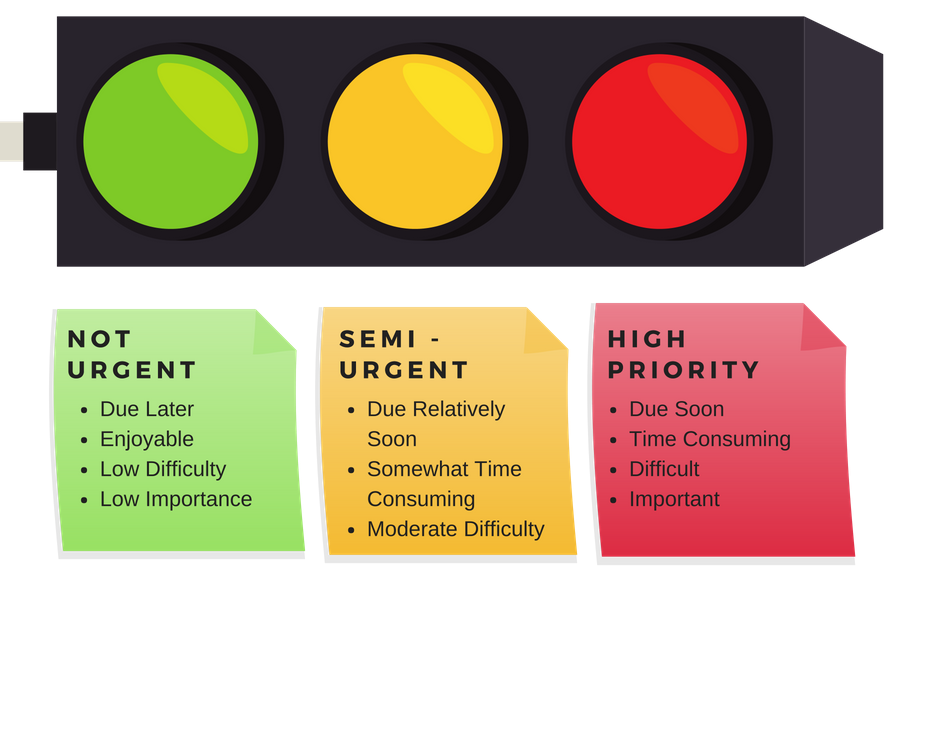
Tip 3. Take regular study breaks
A mental reboot now and again is essential for peak academic performance. In periods of prolonged study, your ability to process information quickly diminishes the longer you spend studying. So the longer you study, the less proactive you are.
A recommended method to break down work intervals is the Pomodoro Technique. With this technique, 25 minutes is spent completing the required task followed by a 5 minute break. After 4 consecutive 25 minute blocks, have a longer 15-30 minute break to properly recharge.
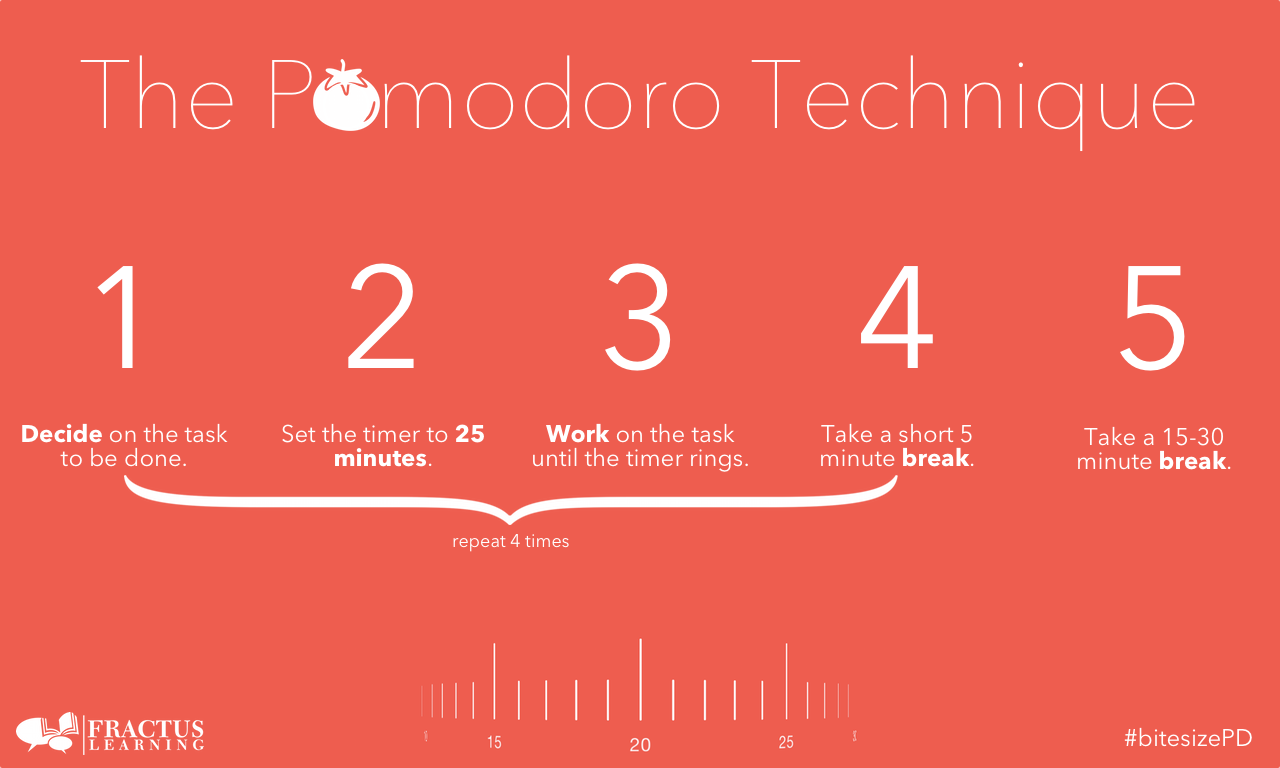
Alternatively, you could try the ‘power hour’ technique and study for an hour followed by an hour break.
Another strategy you should maximise is switching study modalities. Jump between reading, drawing diagrams and flowcharts on a whiteboard and watching videos to mitigate your chances of not absorbing knowledge.
You can personalise this strategy by ensuring your study modalities match with your learning language. This method is particularly effective for individuals who’s learning aligns with more than one language.
Techniques such as these prevent students from falling down the ‘overlearning’ rabbit hole. Cognitive activities which require the learner to be able to retain all of the information are the worst to complete in large study blocks.
Overlearning decreases an individual’s ability to recall information soon after its learnt. This means that you could be spending hours trying to learn Pythagoras’ theorem only to be unable to rewrite the equation merely 30 minutes after your last four hour study session. Instead, stagnate your learning for the most effective results and to give your brain the opportunity to have a break
Tip 4. Say goodbye to procrastination
Procrastination is normal but excessive procrastination is problematic. To minimise how much time you spend procrastinating, try eliminating any distractions.
Social media is a big one. Close your Facebook tab on your computer and log yourself out if you have to. Put your phone on ‘do not disturb’. Mute any group conversations while you study and turn your phone face down.
You might not even realise it, but when a notification pops up your mind flicks to your phone! In that miniscule 2 seconds where you’re distracted, your focus starts to slip and 99% of the time, you have to refresh your memory by reassessing work you’ve already completed. The amount of time wasted refreshing your memory could be a whole other hour spent adding to an assignment!
However, for some people, the cause of their procrastination does not stem from scenarios like these. Rather, procrastination can originate from a fear of failing where students find themselves putting off assignments and avoiding set tasks.
It may emerge when you’re unsure what to write in your discussion or when you’re feeling overwhelmed because you left a presentation to the last minute. This anxiety can spiral into further task avoidance.
The best advice here is to acknowledge what it is that is preventing your from completing set work before planning a method, tailored to you, to help you complete it. Simply talking about why you are spending more time procrastination than studying can minimise the feeling of being overwhelmed!
Tip 5. Schedule time for yourself
While keeping yourself busy is important, your mental health and wellbeing is paramount.
Make sure you schedule time for yourself. If you’re eating lunch frantically at your desk while trying to finish all your work by the end of the day or consistently putting off self-care activities such as going to the gym or attending social events, then an intervention is much needed.
Start with deciding what activities you’re wanting to do in your ‘me’ time. Rather than pencilling in ‘downtime’ into your diary, be specific. By identifying the ways in which you wish to spend time on yourself, you will feel more inclined to actually do those things.
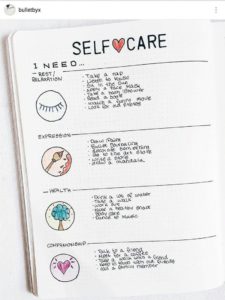
Tip 6. Learn the word “no”
Take it from someone who never had the word “no” in their vocabulary until recently – this word is a game changer (just don’t let it become your favourite word!).
It is perfectly okay to say no! Sometimes, taking on too many commitments is the downfall to success and creates an environment where you are unnaturally overwhelmed. The feeling of being overwhelmed leads to an inability to self-soothe in times of relaxation or cope with difficult situations.
Something I see across all of my students and peers is FOMO syndrome (Fear of Missing Out). Generally you’d most commonly hear this term being thrown around when it comes to buying Splendour Tickets because your friends are going or seeing Ed Sheeran in concert for a second time on the same tour (guilty).
However, it’s a syndrome that pops up just as much during regular day to day activities. Stomp out FOMO syndrome! If you’re suffering from FOMO syndrome it’s usually based upon a perception of what your peers are doing and isn’t a true reflection of the way you wish to spend your time.
Tip 7. Get a good night’s sleep
Finally, one of the most important and practical tips to effectively managing your time is ensuring you’re getting enough shut-eye to function. Since there are only 24 hours in a day, students think that minimising their sleeping time will mean they will have an additional few hours to do work.
This is probably one of the worst things you could do when trying to time manage effectively. A lack of sleep affects multiple aspects of your life. An accumulation of lost sleeping hours could lead to “sleep debt” which affects your hormone regulation, cognitive skills and you’re decision-making capabilities.
Those who suffer from sleep debt find themselves trying to catch-up on the lost hours in one hit (for students, this is usually after they submit an assignment or sit an exam). The problem with this is students aren’t gradually trying to regain their lost sleep and their future sleeping patterns are affected in turn.
The National Sleep Foundation suggests the following sleep ranges:
- School age children (6-13 years): 9-11 hours.
- Teenagers (14-17): 8-10 hours.
- Young Adults (18-25): 7-9 hours.
- Adults (26-64): 7-9 hours
If you’re really strapped for time and you need a quick alertness boost, opt for a powernap. While naps should not be treated as ‘fillers’ for when you don’t secure the recommended hours of shut-eye, they can be a short-term solution. So if you’ve missed steps 1-6 and are up trying to finish an assignment the night before, have a 20 minute powernap and learn for next time!
The most important takeaway from this is that you find a solution that works for you. Good time management is not something you are born with, it is a skill that is developed over your lifetime and is influenced by your personality, your upbringing and those you spend time with. Taking the time to reflect upon these factors will allow you to not only see why you have (or haven't) developed your time management skills and provides a platform for you to begin improving!
